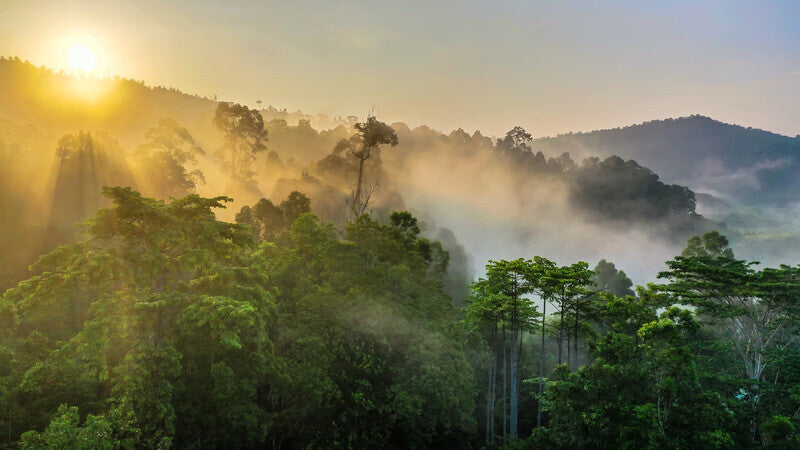
Re:Wild: Robin Moore
We had the incredible opportunity to chat with Robin Moore, Vice President of our flagship charity Re:Wild, about their groundbreaking mission alongside the well-known actor, LØCI shareholder & philanthropist Leonardo DiCaprio.
With an unwavering dedication to conservation projects on a global scale, Re:Wild is paving the way for significant positive change in our environment. Robin Moore shared his enthusiasm for this cause and highlighted how it encompasses much more than just preserving wildlife; it involves restoring entire ecosystems by reintroducing key species and promoting biodiversity.
What is the biggest issue facing wildlife today?
Since 1970, wildlife populations have declined globally by some 70%. The biggest issue facing wildlife today is the way in which we use our land and sea. How we grow our food and extract products is driving the destruction of ecosystems and the decline of wildlife. So we need to be conscious as consumers and champion brands who are making a real and tangible commitment to protecting the wild. We created a guide called Re:wild Your Life to provide tips and tricks on how to live more sustainably and even have a positive impact on biodiversity, and we just launched Re:wild Your Fridge, a campaign to inform and engage millions of people in thinking more deeply about where our food comes from and how it impacts not just our own health but the health of our planet.
A project we here at LØCI found very interesting was the reintroduction of the Tasmanian Devil into the Australian environment. Could you elaborate on the importance of selecting specific Tasmanian devils for reintroduction to ensure a robust population in the sanctuary?
Tasmanian Devils are an excellent example of ecosystem engineers - their presence helps keep ecosystems healthy and actually reduces the severity of wildfires. They do this by keeping feral predators - cats and foxes -at bay, which allows native small mammals to recover. These small mammals turn soils as they forage, helping forests regenerate by spreading seeds and reducing the intensity of fires by burying leaf litter. Devils are also scavengers, and by feeding on dead animals they keep disease under control.
The Tasmanian Devil is actually native to mainland Australia, but was driven to extinction likely because of competition from introduced dingoes. Their return after a 3,000 year absence is an important milestone in helping heal Australia’s native ecosystems.
Apart from the Tasmanian devil reintroduction, what other cornerstone species does RE:WILD plan to reintroduce to the wild sanctuary, and how will these species contribute to restoring the natural balance in the ecosystem?
Working with our good friends in Australia, Aussie Ark, this project aims to restore seven native species including the Tasmanian Devil, namely: Eastern Quoll, Brush-tail Rock Wallaby, Rufous Bettong, Long-nosed Potoroo, Parma Wallaby and Southern Brown Bandicoot. One little bandicoot can dig up an elephant’s worth of soil in a year. Together with the other forest floor soil engineers such as bettongs, potoroos, and bilbies, these animals massively reduce fuel load and literally reforest as they plant tree seeds. Potoroos and their marsupial relatives spread beneficial fungi that maintain tree root health and, through a symbiotic relationship with trees, store more carbon per acre than any other forests on the planet.
We also recently announced that, with support from Re:wild, Bangalow Koala Project has planted, maintained and restored over 4,500 native trees to revegetate Koala habitat in the Richmond Valley of northern New South Wales in Australia. Last year the Australian government declared the Koalas an endangered species, driven to the brink by devastating fires, drought, habitat destruction and disease. So it’s vital that we protect and restore the habitat of this iconic species!
Beyond the Tasmanian devil reintroduction, what other projects and partnerships is RE:WILD currently engaged in to further wildlife conservation and rewilding efforts worldwide?
We work with more than 400 partners in 84 countries, and have conserved millions of acres of wildlife-rich habitats. One of the most inspiring recent successes has been the restoration of Redonda Island in the Caribbean, which has been transformed from a barren rock into a verdant oasis for wildlife.
What is the most uplifting animal rescue RE:WILD has been a part of?
In the aftermath of the Australian wildfires we supported rescue efforts for many species from Koalas to Kangaroos. I visited some of the fire-affected areas with our partners. We brought food for Brush-tailed Wallabies that were going hungry and rescued rare turtles from ponds that were drying up. But our mission and approach is really about the longer term view of protecting and restoring wild places and wildlife so that they are resilient to the affects of climate change and habitat loss.
Looking ahead, what exciting ventures and collaborations do you envision for RE:WILD in the coming years?
We have a growing body of work in the Amazon and Andes regions, working closely with Indigenous Peoples and local communities. Eighty percent of the Earth’s biodiversity is on Indigenous territories, so we cannot protect biodiversity without supporting their rights and listening to them. This statistic is no coincidence.
For individuals seeking to make a positive difference in their community, do you have any advice or guidance on how they can get involved in wildlife conservation efforts?
Besides supporting groups who are making a difference on the ground (like Re:wild!), you can connect with and support the wild around you. Learn what lives - or used to live - in your community and take action to restore it. Planting native flowering plants, for instance, can attract and support a suite of pollinators. And refer to our Re:wild Your Life guide for many ways that you can make a difference!



